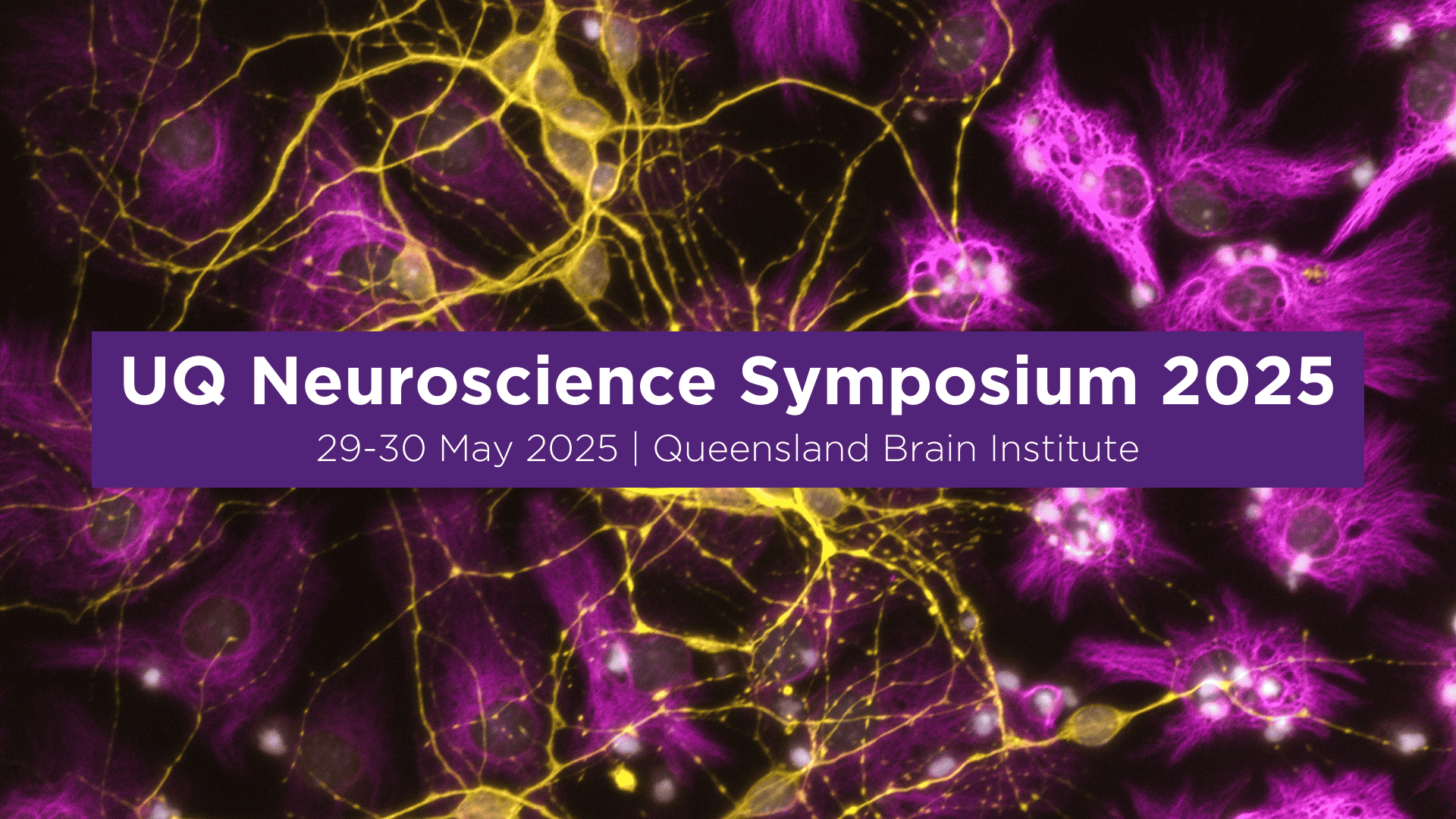Venue

Date: Thursday 29 May 2025 - Friday 30 May 2025
Time: 29th from 8.50am - 4.30pm followed by BBQ and Posters, 30th from 9.00am - 12.30pm
Venue: Queensland Brain Institute, Level 7 Auditorium (Building 79, University of Queensland, St Lucia)
The biennial UQ Neuroscience Symposium is being held at the Queensland Brain Institute on 29-30 May 2025.
Save the date and join your neuroscience colleagues to hear the latest insights and research in the field.
Themes
- Protecting the brain against neurodegeneration
Professor Jason Mattingley (QBI, Psychology), Dr Matilde Balbi (QBI), Professor Trent Woodruff (SBMS), Dr Margreet Ridder (EMCR, QBI), Melinder Gill (HDR student, SBMS).
- Cognitive neuroscience - unravelling how the brain thinks
Professor Jason Mattingley (QBI, Psychology), A/Professor Jess Taubert (CRiSP, HMBS), Dr Hannah Filmer (Psychology), Dr Melody Mei Yan Chan (ECMR, QBI), Dr Margaret Moore (EMCR, QBI)
- Neurogenetics and gene regulation
Mason Musgrove (QBI), Dr Gabriela-Oana Bodea (QBI, MRI), A/Professor Miguel Renteria (QIMR).
- Clinical and basic science synergies in neurology
Professor Pamela McCombe (UQCCR), A/Professor Judith Greer (UQCCR), A/Professor John O'Sullivan (UQCCR), A/Professor Ian Harding (QIMR), A/Professor Robert Henderson (UQCCR).
- Developmental mechanisms underlying neurological disorders
Dr Melanie White (IMB), Dr Nathalie Dehorter (QBI), Dr Kirat Chand (UQCCR), Dr Itia Favre-Bulle (EMCR, QBI), Madeline Eve (HDR student, QBI).
A networking event will be held at the end of the first day of the symposium aimed at devising a UQ neuroscience research strategy. All attendees are welcome. Canapes and drinks will be provided.
Prizes will be awarded for best poster presentations for students and postdocs.
Keynote Speaker

Professor Glenn King
Institute for Molecular Bioscience (IMB)
Program
Thursday 29 May
| Time | Event |
| 8:50am – 9:00am | Welcome |
| 9:00am – 10:20am | Protecting the brain against neurodegeneration
|
| 10:20am – 10:50am | Morning Tea |
| 10:50am – 12:10pm | Cognitive neuroscience - unravelling how the brain thinks
|
| 12:10pm – 1:30pm | Lunch and Posters |
| 1:30pm – 2:10pm | Keynote Lecture Prof Glenn King (IMB) |
| 2:10pm – 3:10pm | Neurogenetics and gene regulation
|
| 3:10pm – 3:40pm | Afternoon Tea |
| 3:40pm – 4:30pm | Discussion UQ Neuroscience research strategy |
| 4:30pm – 6:00pm | BBQ and Posters |
Friday 30 May
| Time | Event |
| 9:00am – 10:30am | Clinical basic science synergies in neurology (30 min/topic joint presentations) Ataxia - A/Prof John O'Sullivan (UQCCR), A/Prof Ian Harding (QIMR), A/Prof Robert Henderson (UQCCR), A/Prof Shyuan Ngo (AIBN)
|
| 10:30am – 11:00am | Morning Tea |
| 11:00am – 12:20pm | Developmental mechanisms underlying neurological disorders
|
| 12:20pm – 12:25pm | Closing Prof Helen Cooper (QBI) |
| 12:25pm – 1:30pm | Lunch |
Local Organising Committee
Chair, Helen Cooper (QBI) h.cooper@uq.edu.au
Lata Vadlamudi (UQCCR) l.vadlamudi@uq.edu.au
Carlie Cullen (MRI) carlie.cullen@mater.uq.edu.au
Stephan Thor (SBMS) s.thor@uq.edu.au
Nela Durisic (QBI) n.durisic@uq.edu.au
Adekunle Bademosi (QBI) a.bademosi@uq.edu.au
